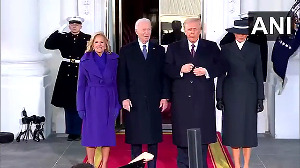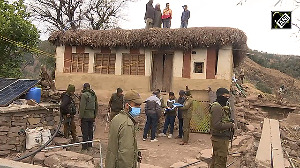Even as Cairn Energy is putting Rajasthan on the oil map of India, the state government has started demanding its share of profit petroleum from the Centre for crude produced from its territory.
Rajasthan Chief Minister Vasundhara Raje has written to Union Petroleum Minister Ram Naik demanding that profit petroleum be shared equally between the state and the Centre.
Profit petroleum is the share of crude that the central government is entitled to receive in case of a commercial discovery.
Profit petroleum is a biddable item and it is quantified in the production-sharing contract between the government and the company exploring the acreage.
The wealth effect
- Profit petroleum is the share of crude that the Centre is entitled to receive in case of a commercial discovery.
- Chief Minister Vasundhara Raje writes to Union Petroleum Minister Ram Naik on the issue.
- At present, all profit petroleum go to the central government.
- Profit petroleum is a biddable item and it is quantified in the production-sharing contract.
- The state plans take up development projects in desert areas where the petroleum reserves are located.
Under the prevailing system, all profit petroleum, whether for onland or offshore production, go to the central government. States only get royalty from onland oil and gas production.
Joining the chorus with Assam and Gujarat, Raje has said since state governments make substantial investments for supporting infrastructure, essential public services, security and rectifying environmental damages; they should be given a share in profit petroleum.
Moreover, since Rajasthan is a desert state, development projects will also be taken up in the desert areas of the state where the petroleum reserves are located.
The chief minister has said the state government was the leasing agency for land required for hydrocarbon exploration and production, even though it has not been made a partner in the production-sharing contract.
The other arguments put forward by the chief minister to support her claim include the fact that since hydrocarbons are a non-renewable and finite resource, the state government has the right to exploit such resources and so the cash-flow from them should be directed towards development activities in the state.
The chief minister has pointed out that the Constitution says while the Union government is the owner of minerals found beneath the seabed within the country's maritime zone, state governments are the owners of all inland minerals, including petroleum reserves.
While stressing that she is not against the concept of the New Exploration Licensing Policy for the hydrocarbon sector, Raje says the powers of the Central government under the Constitution over onland hydrocarbons are limited to the regulation and development of petroleum and natural gas and, in no way fetters the ownership rights of state governments over onland oil and gas.
Therefore, financial benefits from the removal and consumption of minerals are exclusively in the state government's domain.The royalty payments that now go to the states, according to the chief minister, are not an adequate compensation for the permanent loss of minerals.
Moreover, "royalty rates are usually kept low and are not revised regularly" unlike the division of profit petroleum (between the contractor and the Union government), which depends on the investment multiple in a particular year for the development area.
The chief minister says the only option available to adequately compensate states is by giving them a share in profit petroleum.






 © 2025
© 2025